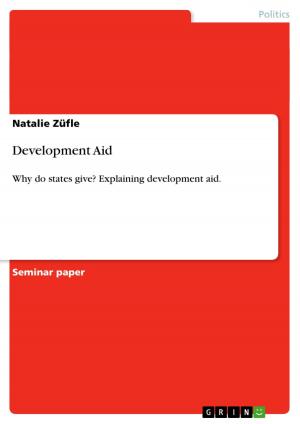The Stolen Generations
Critical reflections on the forced removals of semi-indigenous children in Western Australia from 1900 until today
Nonfiction, Reference & Language, Study Aids, ESL, Foreign Languages| Author: | Marvin Hanisch | ISBN: | 9783640948581 |
| Publisher: | GRIN Publishing | Publication: | July 1, 2011 |
| Imprint: | GRIN Publishing | Language: | English |
| Author: | Marvin Hanisch |
| ISBN: | 9783640948581 |
| Publisher: | GRIN Publishing |
| Publication: | July 1, 2011 |
| Imprint: | GRIN Publishing |
| Language: | English |
Pre-University Paper from the year 2009 in the subject English - Applied Geography, grade: 1,0, , language: English, abstract: The paper analyses the forced removals of Indigenous children in Western Australia from their families in the 20th century. Nowadays, this generation of children has become known as 'The Stolen Generation' in Australia. To begin with, the author underlines the importance of 'The Stolen Generations' for Australia's history by highlighting the national 'sorry day' in 2008 where the Prime Minister officially apologised to the Indigenous People. As a starting point, background information about the situation of Indigenous people in Australia is provided. Moreover, racial theories and ideologies that were prevalent in the 20th century are discussed. The relevance of these race questions is exemplified by describing the situation in so-called 'mission camps' where many of the removed children were brought up. Furthermore, the concept and apparent 'threat' of the 'half-caste' (Indigenous Australians of mixed parentage) is outlined and political, legal and public actions concerning the Indigenous People are presented. To illustrate the finding, there is a brief analysis of the movie 'Rabbit-Proof Fence' by Phillip Noyce and the drama 'Stolen' by Jane Harrison. Moreover, the question of genocide in the context of the United Nations resolution is discussed. Finally, the author evokes the sensitive topic of compensation funds for the 'Stolen Generations' and gives a brief cross-reference to the very similar history in Canada and New Zealand.
Pre-University Paper from the year 2009 in the subject English - Applied Geography, grade: 1,0, , language: English, abstract: The paper analyses the forced removals of Indigenous children in Western Australia from their families in the 20th century. Nowadays, this generation of children has become known as 'The Stolen Generation' in Australia. To begin with, the author underlines the importance of 'The Stolen Generations' for Australia's history by highlighting the national 'sorry day' in 2008 where the Prime Minister officially apologised to the Indigenous People. As a starting point, background information about the situation of Indigenous people in Australia is provided. Moreover, racial theories and ideologies that were prevalent in the 20th century are discussed. The relevance of these race questions is exemplified by describing the situation in so-called 'mission camps' where many of the removed children were brought up. Furthermore, the concept and apparent 'threat' of the 'half-caste' (Indigenous Australians of mixed parentage) is outlined and political, legal and public actions concerning the Indigenous People are presented. To illustrate the finding, there is a brief analysis of the movie 'Rabbit-Proof Fence' by Phillip Noyce and the drama 'Stolen' by Jane Harrison. Moreover, the question of genocide in the context of the United Nations resolution is discussed. Finally, the author evokes the sensitive topic of compensation funds for the 'Stolen Generations' and gives a brief cross-reference to the very similar history in Canada and New Zealand.















